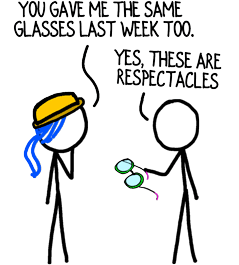You and your colleagues are upbeat, enthusiastic, fun to be around people with a passion for solving problems. However, there’s one attitudinal quirk that, if left unchecked, will undermine your efforts to win and delight clients.

Your consulting firm is all about nurturing warm, long-lasting partnerships and collaborating to create value. Unfortunately, there’s one ingredient in that yummy, kumbaya stew that can sour.
Respect.
Mutual respect is foundational for a successful consulting firm. It feeds strong, beneficial relationships between your practice and your clients.
You know your clients respect you, else they wouldn’t hire you and put up with your demands for time, money, data and chocolate.
But does everyone at your consulting firm hold you clients in the highest regard? Yes, mostly.
Well, maybe.
Okay, not entirely.
The Challenge
Your clients are, on the whole, very lovely people.
You know they are far from perfect. Thank goodness—that’s why they need you!

Unfortunately, however, you’ve also watched your clients commit perplexing errors, act against their own interests, slow down projects intended to help them, step in glue traps, and take someone else’s cupcakes from the office fridge.
In the face of all that questionable conduct, it’s easy to lower your regard for your clients.
As a result, we often hear consultants refer to their clients in dismissive, unflattering or sometimes disparaging terms. Yikes!
That’s a challenge for consulting firms, because it’s difficult to stay Right-Side Up—to make your practice about your clients, when you don’t admire your clients.
Lack of respect can lead to dismissiveness, contempt and worse. Those seep into a consultant’s language, tone, devotion to quality, and unwavering support in the face of challenges.
Yes, your clients are occasionally ill-advised, goofy, or clueless. They’re also well-intentioned, ambitious, hard-working, fun-loving and way smarter than you at some things.
Action Step
Give permission across your consulting firm to point out when anyone says something unkind about a client. Focus on keeping your commentary positive and Right-Side Up.

A moment of frustration is normal and reasonable, as is sharing your amusement over your clients’ comic quirks and tales of misadventure.
Quickly get past frustration, though, and put your clients up on the pedestal where, for the purposes of serving them effectively, they belong.
How do you maintain respect for your clients?
Text and images are © 2024 David A. Fields, all rights reserved.

 David A. Fields Consulting Group
David A. Fields Consulting Group 

As Investor Relations Consultant, the earning result seasons is very stressful for us as well as for our clients, so this article is very timely. For us, just simple food takeout from the Boss can release the tension and increase calorie:-) By the way, no comic caricature related to chocolate this time? 🙂
Yep, I’m all for food as a stress reliever, Ferdinand. Good on you for not letting the stressful times hurt your attitude. (Oh, and in the first illustration, the ladder led up to a trap door into the heavenly chocolate factory. But don’t tell anyone. 🙂)
I appreciate your sharing your case study and helpful, tension-relieving strategy!
Early in my career a more senior consultant said, “We’re not going to engage in client-bashing” (meaning, speaking ill of or looking down on the clients behind their backs). It had been kind of common among us young, arrogant, newly-minted MBAs. To this day I make sure that, if I have something to say, I say it to the client. What they are doing is hard and I always – even when delivering tough news or feedback – remind them how I admire what they have undertaken and are accomplishing.
That is outstanding, Jonathan. Yes, as you said, it’s fairly common among younger, arrogant consultants to “client bash.” However, not everyone seems to lose their arrogance as the years pass. Only saying away from the client what you’re willing to say directly to the client is a good policy.
Big thank you for that excellent addition to the discussion, Jonathan.
Completely agree. To tell our customer the truth is what they expect from us, and it’s actually what they pay us for.
Of course the truth is not always nice, actually in our business it’s more often ugly and unpleasant than nice.
We present those unpleasant news as opportunities for custumers to improve and to grow. It often works … in Germany they say “nicht immer, aber immer öfter”. 🙂
I ran your quote through my translator and it came out, “Eat more chocolate.” I totally agree. (Granted, I have my translator set up so that no matter what goes in, the translation is the same, but that makes it easy to agree with people who speak other languages.)
You’re right, we have to tell our clients the difficult truths. Fortunately, we can do that while maintaining our belief in them and our regard for them.
I’m glad you weighed in today, Tomaz!
I have failed at this. I don’t often say negative things out loud, but I do think them. Phenomenal article, David. I will amend my ways.
Your thoughts are what they are–harder to control. However, you can notice them (i.e., mindfulness) and then adjust accordingly. The fact that you’re willing to admit you have this opportunity and you’re committed to taking steps to improve your practice is high testimony to you as a person and consultant, Nate.
Thank you for joining the conversation and sharing your personal example. Very much appreciated, Nate.
Many years ago we were working with several clients across different geographies, and one of the common themes on the consulting teams was how stupid the clients were.
Once I reminded them that they were smart enough to hire us, people changed their perspective
That’s a perfect case study, Brian. It’s apparently a normal human tendency to try to elevate oneself by stepping on others. I’m not qualified to say where that sort of thinking comes from; however, in our world, it’s a good mindset to leave behind. We support others in achieving their success and, in doing so better, uplift everyone–them and us.
Thank you for your excellent illustration of the topic, Brian!
Great advice. When a negative mindset begins to creep in with me or a team member, I think back to when I was the client juggling “all the things” and remind the team that we see just a slice of their world. Other times, it is the result of scope creep, and I know we need to do a better job managing expectations.
Excellent points, Jill. Staying Right-Side Up includes making an effort to understand what’s going on in the client’s world and where your consulting firm fits. (Alas, sometimes we’re not a big piece of their world at all.)
Thank you for adding your smarts to the conversation, Jill!